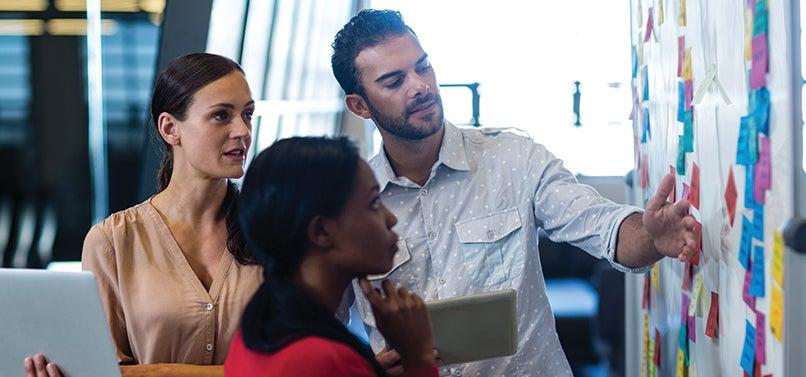
IRC Changemaker Challenge winners
Students in the Graduate College’s Interdisciplinary Research Colloquium (IRC), a course for new graduate students interested in collaborative research and cross-disciplinary research application, applied to the 2018 Changemaker Challenge Community Action Grant. Each year, IRC students groups vie for grant funding for programs of their design.
The Changemaker Challenge, sponsored by ASU’s Changemaker Central, is an applied opportunity for undergraduate and graduate ASU students to make a difference in local and global communities through their creation of an innovative project, prototype, entrepreneurial venture or community partnership.
This year, two teams from IRC were awarded grants in the Changemaker Challenge, with one receiving the Woodside Community Action Grant and another the Sexual Violence Prevention Grant.
The programs they conceived, and will now create, are designed to promote engagement in communities that are passionate about implementing positive social change.
Marcos Martinez, Gabriel Vinas, Tisa Loewen and Kamryn Morris received the Woodside Community Action Grant for their solutions-focused and sustainable engagement plan. Martinez, Vinas, Loewen and Morris were awarded for their Modeling Future Minds proposal, a series of workshops engaging adult and child learners through collaboration on an anatomy based facial reconstruction art project.
At their workshop, they will demonstrate the major muscle groups of the face and their functions through using a clay model and photographic imagery. Their class will meet for two hours, one day a week, over a three week period.
Involving adults and children in STEM activities will give an opportunity to engage both parents and children together in science literacy and promote a more positive and engaging outlook on the different STEM fields.
“The only thing we hope for people to bring to this workshop is an open mind to science and learning. There is often this notion of ‘science is not for me,’” said Morris. “We want them to be open to the idea that there are many ways that they can participate in science, just like there are many ways that they can acquire knowledge.”
The team believes the power within community based interventions — in this case, a workshop — is the ability of the interventions to work cohesively with communities, as opposed to traditional research, which works on communities.
“By engaging adult and child learners we are hoping to achieve awareness in participants that there is no right or wrong learner,” said Morris. “Everyone is capable of learning and engaging in science, art and academia.”
While Modeling Future Minds aims to increase STEM engagement, the proposal by IRC scholars Stephanie Sparks, Jennifer Lobos, Colleen Sullivan and Noah Siffin aims to engage undergraduate, graduate students and faculty in focusing on sexual violence awareness through education, skill-building and social connectivity.
Their proposal aims to educate around sexual assault prevention through engaging educational workshops with sexual awareness speakers, literature resources and recommendations of responses to those affected by sexual assault as a supportive, empowering event.
“The speakers that we are organizing for our workshops are targeted as individuals who can bring new perspectives on topics related to sexual violence prevention,” said Sparks. “By providing information that is not easily accessible via alternate avenues, we hope to attract more attendees.”
They will focus on multiple elements of sexual violence and sexism awareness, including perceived tolerance, symbolic policy compliance, male-dominated work settings and hierarchical power structures.
A major focus of the workshop is on the ‘leaky pipeline’ model in hierarchal workplaces, which looks at the relative lack of women in higher leadership positions. The workshop will also examine hierarchical differences in the workplace and its relationship to sexual violence.
The workshop is already gaining interest outside ASU, with team members fielding inquiries from the University of Arizona’s sexual violence and resource teams.
“We are hoping to spread awareness and educate the entire academic community — from undergraduates to faculty members and administrators — on the issue of sexual violence in field-based sciences,” said Sparks.
Both IRC groups have received their grant and, within the next couple months, plan to further develop their workshops and prepare to launch their ideas into action.
For more information about the Changemaker Challenge and its community action grants, visit the Changemaker website.
More stories from the Graduate Insider

Reimagining search and rescue with drone swarm technology
Johnathan Lok is a first-year PhD student, Defense Advanced Research Projects Agency (DARPA) researcher, and the second-place winner of the 2025 Change the World competition for his Rescue Swarm Project. He currently holds a master's degree in electrical engineering from the Fulton School of Engineering.

Inside Graduate College’s Three Minute Thesis competition

Mentoring with intention: Strengthening graduate support at ASU
January is National Mentoring Month, a time to celebrate the impact mentoring can have and to reflect honestly on where gaps remain. At Arizona State University, mentoring is recognized as a critical component of graduate student success.